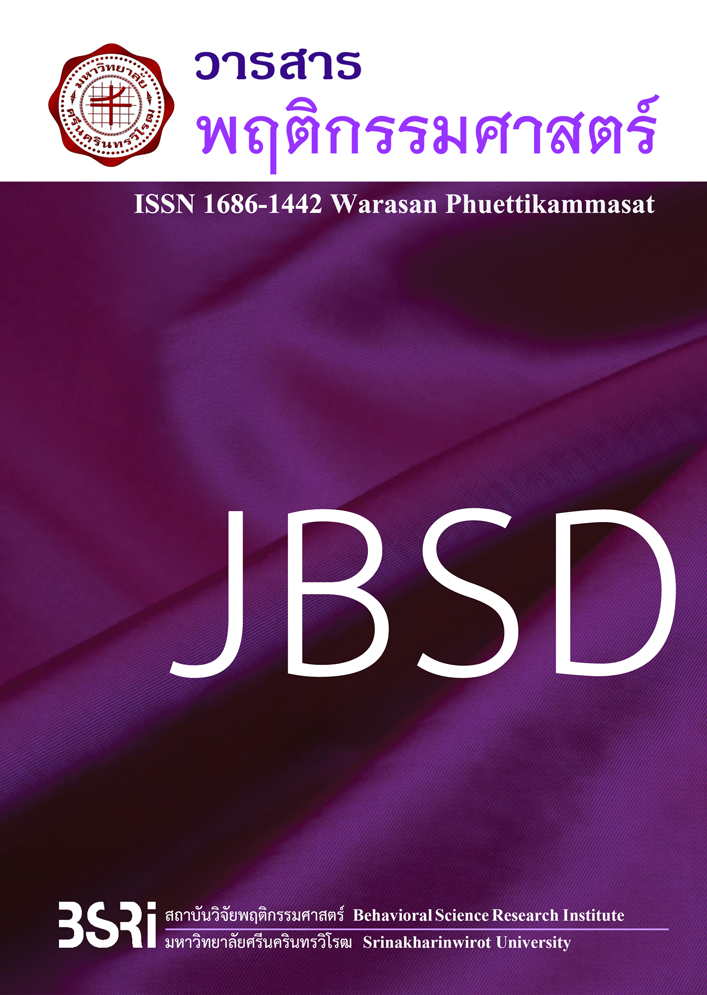การตรวจสอบความตรงโมเดลการวัดกลยุทธ์การกำกับตนเองในการเรียนรู้เชิงวิชาการของนักศึกษามหาวิทยาลัย
Abstract
Validation of the Measurement Model of Academic Self-regulation Learning Strategies Among University Students
The purpose of this research was to validate the measurement model of academic self-regulation learning strategies among university students in Bangkok area. The research process followed the development of indicators for self-regulation learning initiated by Wolters, Pintrich, & Karabenick (2003) and the previous literatures. The participants were 410 university students in Bangkok area. Data were collected by academic self-regulation learning questionnaires with high reliability and the second order factor analysis with maximum likelihood estimation method was employed to analyze the data.
Results showed that the 13-indicators of academic self-regulation learning using collected items total correlation criterion showed high internal consistency reliability (.89 for the academic cognition scale, .85 for the academic motivation scale and .85 for the academic behavior scale) and the validation by using second-order factor analysis technique were showed as follows: (1) The 3 components of student‘s academic self-regulation learning consisted of cognition domain including 4 indicators, motivation domain including 6 indicators, and behavior domain including 3 indicators. (2) The measurement model of academic self-regulation learning was good fit with the empirical data indicated by Chi-square, GFI, AGFI, RMR, and RMSEA criterions.
Keywords: Academic Self-Regulation Learning, Late Adolescence, Measurement Model
การวิจัยครั้งนี้มีวัตถุประสงค์เพื่อตรวจสอบความตรงเชิงโครงสร้างของโมเดลการวัดกลยุทธ์การกำกับตนเองในการเรียนรู้เชิงวิชาการของนักศึกษามหาวิทยาลัย เขตกรุงเทพมหานคร ตามการศึกษาของ Wolters, Pintrich, และ Karabenick (2003) และการศึกษาเอกสารที่เกี่ยวข้อง กลุ่มตัวอย่างในการวิจัยคือนักศึกษาวัยรุ่น อายุเฉลี่ย 19 ปี เขตกรุงเทพมหานคร จำนวน 410 คน เครื่องมือที่ใช้ในการวิจัยประกอบด้วยแบบสอบถามข้อมูลทั่วไป และแบบวัดกลยุทธ์การกำกับตนเองในการเรียนรู้เชิงวิชาการที่ผู้วิจัยพัฒนาขึ้น นำข้อมูลวิเคราะห์ด้วยการวิเคราะห์โมเดลองค์ประกอบเชิงยืนยันอันดับสอง
ผลการศึกษาพบว่ากลยุทธ์การกำกับตนเองในการเรียนรู้เชิงวิชาการ ประกอบด้วย 3 องค์ประกอบหลัก คือ องค์ประกอบที่ 1 กลยุทธ์สำหรับการกำกับตนเองในการเรียนรู้เชิงวิชาการด้านการรู้คิด ประกอบด้วยตัวบ่งชี้ย่อย 4 ตัวบ่งชี้ ได้แก่ กลยุทธ์การท่องจำ กลยุทธ์การเชื่อมโยงความรู้ กลยุทธ์การจัดระบบความรู้ และ การกำกับอภิปัญญา องค์ประกอบที่ 2 กลยุทธ์สำหรับการกำกับตนเองในการเรียนรู้เชิงวิชาการด้านแรงจูงใจ ประกอบด้วยตัวบ่งชี้ย่อย 6 ตัวบ่งชี้ ได้แก่ การพูดกับตนเองเชิงเชี่ยวชาญ การเพิ่มพูนความรู้ด้วยการเชื่อมโยง การเพิ่มความน่าสนใจของเหตุการณ์ พูดกับตนเองเชิงเปรียบเทียบ พูดกับตนเองเพื่อสร้างแรงจูงใจภายนอก และ การให้การตอบแทนตนเอง องค์ประกอบที่ 3 กลยุทธ์สำหรับการกำกับตนเองในการเรียนรู้เชิงวิชาการด้านพฤติกรรม (behavior) ประกอบด้วยตัวบ่งชี้ย่อย 3 ตัวบ่งชี้ ได้แก่ 1) การกำกับด้วยความพยายาม 2) กำกับเวลาและสิ่งแวดล้อมในการเรียน 3) การขวนขวายความช่วยเหลือ โดยมีตัวบ่งชี้ย่อยรวม 13 ตัวบ่งชี้ ผลการศึกษาพบว่าโมเดลการวัดกลยุทธ์การกำกับตนเองในการเรียนรู้เชิงวิชาการ มีความสอดคล้องกับข้อมูลเชิงประจักษ์ดี
คำสำคัญ : การกำกับตนเองในการเรียนรู้เชิงวิชาการ วัยรุ่นตอนปลาย โมเดลการวัด
Downloads
Downloads
Published
How to Cite
Issue
Section
License
Behavioral Science Research Institute, SWU
114 Sukhumvit 23, Bangkok 10110, Thailand.
Tel.02-649-5000 # 17600



